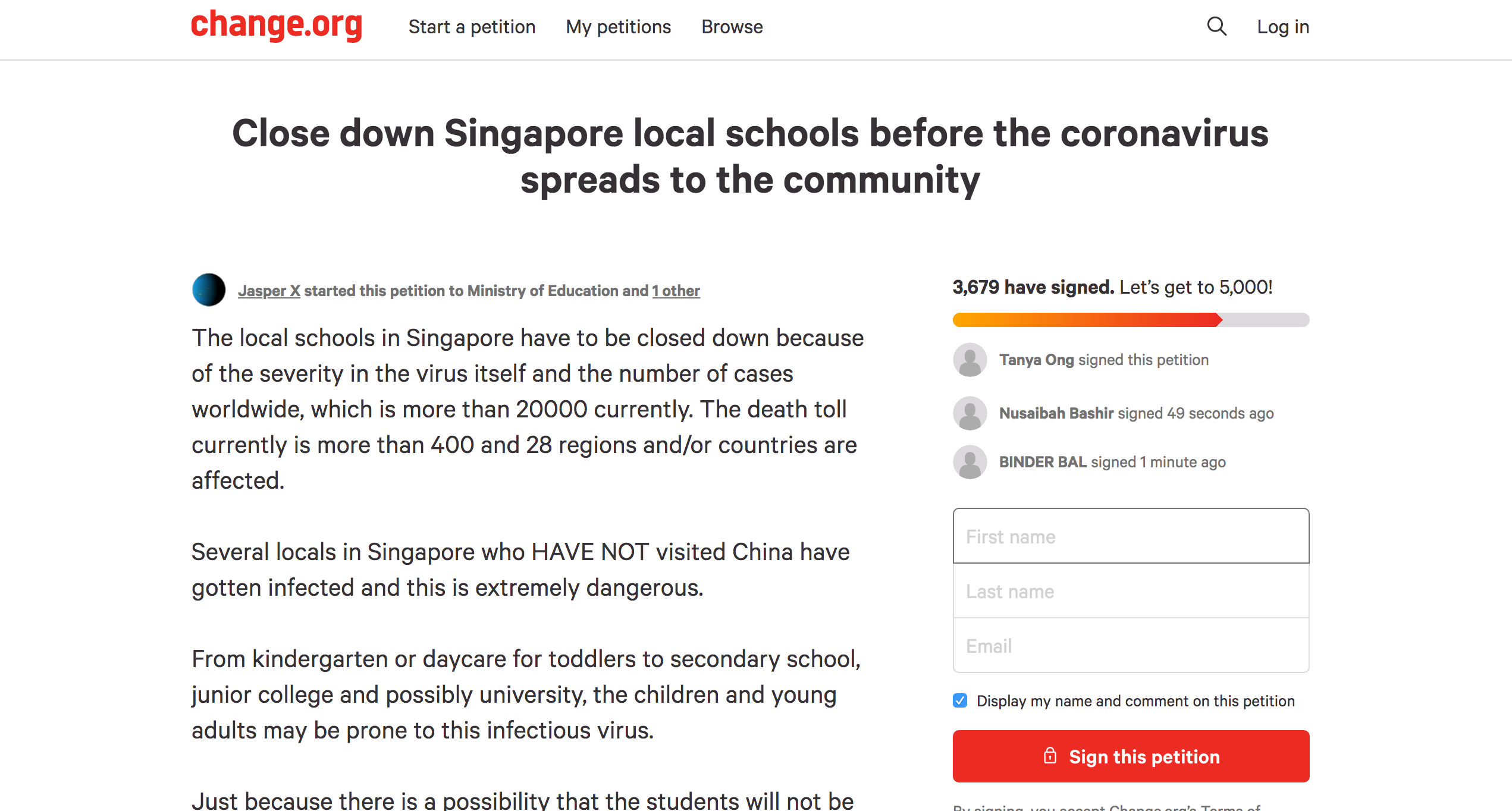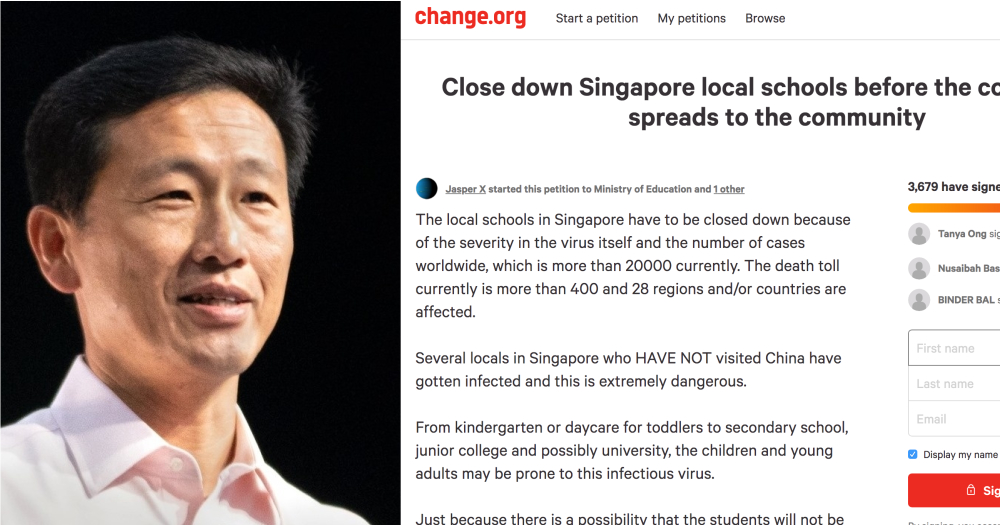The March school holiday comes to an end on Mar. 23, after a one-week break.
With the rise in Covid-19 cases globally, Singapore has also seen a spike in the number of confirmed cases over the past few days, with many of them being imported cases.
Some countries, such as Malaysia, have not only added border restrictions, but have also their closed schools and shops.
As the Covid-19 outbreak continues to spread, many anxious parents in Singapore have expressed their concerns with the school reopening on Monday.
An online petition has been created to appeal to the Ministry of Education (MOE) to close schools.

Screenshot via Change.org.
Parents have also written to MOE to ask why schools are reopening as per normal on March 23, according to Minister of Education Ong Ye Kung.
In a lengthy Facebook post of almost 700 words, Ong explained the three considerations behind MOE's decision to allow young Singaporeans to head back to schools.
https://www.facebook.com/916503765030893/posts/3319748438039735/
Safer for the young to stay in schools
Ong said that there is sufficient scientific evidence that shows that Covid-19 does not affect the young as much as the adults, similar to how the young are comparatively less affected by chickenpox.
Most young patients get it from home or outside of school, such as the confirmed cases from the higher learning institutes.
Citing Group Director of Medicine at NUHS and Chair of the WHO Global Outbreak Alert and Response Network, Dale Fisher, Ong said that it might be safer for young Singaporeans to go to school where they spend more time with each other.
When schools are closed, it is likely that the young will mingle with the rest of the community and other adults, which might expose them to the virus infection even more.
Disruption
Secondly, Ong highlighted that closing schools will disrupt families' lives.
This will pose more challenges for parents who are frontline workers and providers of essential services, as well as those who are unable to find help or afford childcare options while they work.
Precautions in place
More precautionary measures have been implemented in schools to ensure it is safe for students to return after the March holidays, Ong assured.
Students who display any symptoms of being unwell, such as sore throat and cough, will be sent home or isolated immediately.
Those who have travelled overseas from the start of March holidays have been issued a Leave of Absence or Stay-Home Notice.
This applies to both staff members and students.
Checks on travel history will be taken at the school gates as a further precaution, Ong added.
Co-Curricular Activities and external activities have been suspended, so students will only mingle with their classmates.
Students will be seated further apart to practise safe distancing, and they will be reminded to keep up with personal hygiene.
Here's the full text in Ong's Facebook post:
Top photo collage via Change.org and Ong Ye Kung's FacebookSchool is re-opening tomorrow.
I have received many emails and messages from parents. Some asked why not extend the March holidays, especially given the rising numbers of imported cases and impending border closures. Others, including several students, urged MOE to keep schools open as they would like to go to school.
I have personally replied to many parents and students. Actually, part of the reason for the tougher border measures is to ensure we keep Singapore as safe as possible, so that daily activities, like going to work, eating out and attending school, can go on.
But let me lay out MOE’s thinking why school will open tomorrow, but with more precautionary measures. There are three key considerations.
First, science. With the virus being around for several months now, there is body of scientific evidence showing that COVID-19 does not affect the young very much as compared to adults. Parents will be familiar with this concept, as this is the case for other diseases such as chicken pox.
Neither is there evidence to show that the young are vectors or spreaders of the virus. The reverse appears to be the case, where the young get infected by adults at home. Indeed, for the small handful of our students (including those from Institutes of Higher Learning) who were infected, every single one caught it outside of their schools.
See advice by Prof Dale Fisher, Group Director of Medicine at NUHS and Chair of the WHO Global Outbreak Alert and Response Network:
https://www.straitstimes.com/…/children-less-likely-to-be-s….In this context, it may not be a bad idea for our children to spend the bulk of their day in school, where lessons and activities are arranged such that they mingle only with their classmates, who are less susceptible to the virus than adults. They will be quite a resilient group. If we close schools, many will not stay home, but may run around in the community and mingle with a lot more people, exposing themselves to more risk.
In that sense, schools remain safe places for children, especially as they seem to be more resilient against the virus.
Second, disruption. Closure of schools will disrupt many lives, especially parents who are both working, with no domestic help, and have limited childcare options. We are particularly concerned about parents who are healthcare workers and providers of essential services.
Keeping our healthcare system strong is paramount in the fight against COVID-19. Our frontline warriors will be much more assured if their children are in school, meaningfully engaged, in a safe and healthy environment.
Third, precautions. Notwithstanding that the young are more resilient to COVID-19, there is no place for complacency. We have consulted our healthcare experts and put in place many significant additional precautionary measures to safeguard the entire system, to maintain the calm situation we enjoyed before the March holidays.
We have implemented a Leave of Absence/Stay Home Notice policy, with the result that come Monday, every student, teacher, staff, canteen stall operator in school would not have gone overseas since the start of the March school holidays. As a further precaution, there will be 100% checks on their travel history at the gates.
Also, students will only spend their time with two groups - their class and their CCA. All other activities that involve mingling have been suspended. With CCA suspended for two weeks, their only social group is their class.
Another significant precaution is that every morning, every student who is not feeling well, be it with a cough or sore throat, and not just fever, will have to be in an isolation room or sent home.
In class, students will sit apart, just like during exams. Teachers and students will continue to upkeep the highest standards of hygiene. There is constant supervision (for the younger students) and reminders for all students to wash their hands properly and regularly, and avoid touching their faces.
Implemented together, these measures will serve as a robust layer of system defence, complementing the natural defence children may already have, to enable school to continue.
If you like what you read, follow us on Facebook, Instagram, Twitter and Telegram to get the latest updates.
